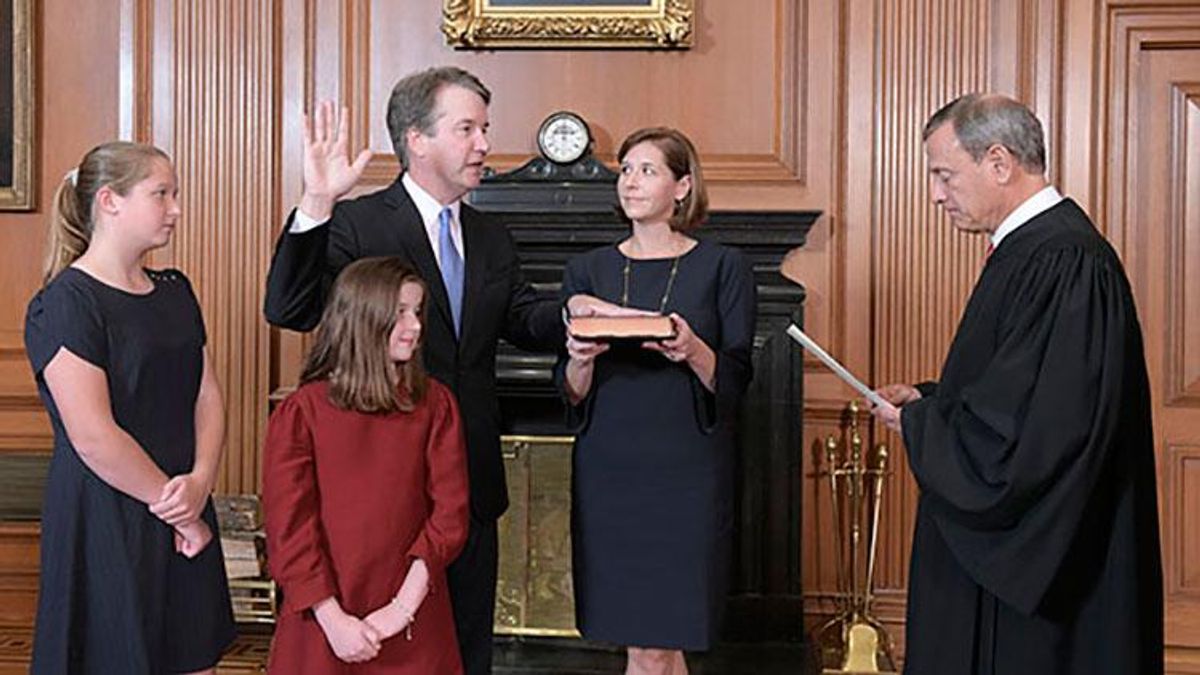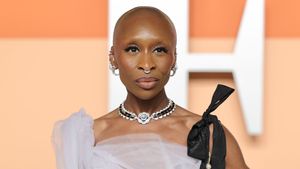During the Democratic debates to date, with the exception of one debate that specifically centered on LGBTQ issues, there has been almost no mention of the issues that the LGBTQ people will face in the years ahead. The November 20 debate was no different despite it being the Transgender Day of Remembrance. With the surge in violent hate crimes over the past few years it was disconcerting that nine candidates failed to mention anything about LGBTQ people. Worse, even when you include the debate specifically about LGBTQ issues, none of the candidates have addressed the real elephant in the room, where the sum of all our fears lies.
The public, as well as some of the LGBTQ community, seem to be unaware of the fact that even if one of the Democratic candidates wins, Trump will have left a legacy of federal courts packed with appointees hostile to LGBTQ issues and women's rights.
Both the candidates on the stage and moderators seem to overlook or forget this fact as well. By the end of 2019, nearly 20 percent of all judges on the federal bench will have been put into place by the Trump administration, assisted by Senate Majority Leader Mitch McConnell and the GOP majority in the Senate. By the end of 2020, it could be close to 30 percent. The Supreme Court is already stacked with a 5-4 conservative majority picked on behalf of the Federalist Society, Alliance Defending Freedom, and the Heritage Foundation. Associate Justice Ruth Bader Ginsburg's health continues to be of great concern. This, coupled with the fact that Associate Justice Stephen Breyer is 81, means we could easily see President Trump leaving a legacy of a 6-3 majority, even if he loses the presidential race in 2020.
The consequences of Trump's legacy will be catastrophic for LGBTQ people. Pundits and progressive constitutional scholars are expectant that the high court will rule in Zarda, Bostock, and EEOC v. Harris Funeral Homes that LGBTQ people are not protected against sex discrimination under Title VII of the 1964 Civil Rights Act. This also means that a ruling that transgender people are not protected by Title IX of the Education Amendments of 1972 will soon follow.
Even if one of the Democratic candidates wins the White House in 2020, they will inherit a federal court system packed with Trump appointees, to which far-right religious legal organizations like the Alliance Defending Freedom will continue to bring a stream of anti-LGBTQ impact litigation. Given that religious-right organizations have had a great deal of input into those judicial nominations, a record number of them have been rated as unqualified by the American Bar Association, and that many of them have previous records of bigoted and hateful comments towards LGBTQ people, we can expect a slew of radical and devastating decisions against LGBTQ people.
Indeed, we're highly likely to see nearly 40 years of legal and legislative progress undone in the space of a few years. Moderators, journalists, LGBTQ organizations, and LGBTQ people must ask candidates hard questions in anticipation of the court decisions to come.
The Democratic candidates must be asked what actions will they take when SCOTUS rules that bans on reparative therapy are unconstitutional.
Candidates must be asked what actions they will take when the Supreme Court rules that allowing trans people in bathrooms creates an inherently hostile environment, the way ADF tried to do in Doe v. Boyerstown, thus creating a de facto national ban on transgender people in bathrooms. This also likely leads to a decision banning transgender people from the military on the basis that their presence creates a hostile environment for cisgender people in the military, even if the Democratic President rescinds Trump's executive order.
They need to be asked how will they react if the Supreme Court rules that religious beliefs allow anyone to ignore civil rights laws pertaining to LGBTQ people, even in deep blue states. Such a ruling is likely coming in the wake of Masterpiece Cake Shop: conservative legal organizations like ADF continue to push cases like Arlene's Flowers v. State of Washington, and the court has tilted right since Kennedy's retirement.
What concrete steps will each Democratic candidate take when the Supreme Court weakens Romer v. Evans, and allows states to pass laws targeting transgender people under the guise of promoting public health? Because this is exactly what the religious right has written that they plan to do in their own blueprint for reshaping America. There are already bills in the works banning health care for trans youth, against the recommendations of essentially every medical and mental health organization in the U.S.
Potential harms are not limited to the transgender community either. With the appointment of a sixth justice, cases that have become the bedrock of rights will be at serious risk.
One of the core principals of justices promoted by the Federalist Society is that religion and public morality are a legitimate basis for law. This places same-sex marriage cases like Windsor and Obergefell in grave danger. It also a potential to threaten Lawrence v. Texas which found sodomy laws unconstitutional. Even to date, 12 states still have these laws on the books. A solid conservative majority would also threaten Romer v. Evans, which bars laws that specifically target LGBTQ people for governmental discrimination.
The public, and especially LGBTQ people, deserve know that the candidates they are voting for are prepared to deal with the never-ending stream of devastating rulings coming from the Trump legacy courts and hyper-partisan conservative judges. Nullifying the worst of these depredations will require swift and well-prepared actions of a Congress and White House working in concert.
BRYNN TANNEHILL is a former naval aviator who currently serves on the boards of SPARTA and the Trans United Fund. She has nearly 300 published articles across a dozen platforms. She lives in northern Virginia with her wife and three children.



















































































